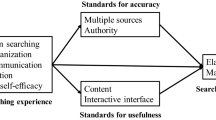Abstract
This study examined an instruction method for the improvement of information processing abilities in elementary school students. Current elementary students are required to develop information processing abilities to create new knowledge for this digital age. There is, however, a shortage of instruction strategies for these information processing abilities. This research proposes a method for teaching information processing abilities based on a problem-based learning model, and was tested with elementary students. The students developed an improved ability to create new knowledge and to present relationships with information through the process of problem solving. This study performed experimental research by comparing pre- and post-tests with twenty-three fifth grade elementary students over the course of 8 months. This study produced a remarkable improvement in information selection, information reliability, information classification, information analysis, information comparison, and information internalization. This study presents an improved methodology for the teaching of information processing abilities.
Access this chapter
Tax calculation will be finalised at checkout
Purchases are for personal use only
Similar content being viewed by others
References
Achilles, C. M., & Hoover, S. P. (1996a). Transforming administrative praxis: The potential of Problem-Based Learning(PBL) as a school-improvement vehicle for middle and high schools.(ERIC Document Reproduction Service No. ED 397-471).
Achilles, C. M., & Hoover, S. P. (1996b). Exploring problem-based learning(PBL) in Grade 6-12. (ERIC Document Reproduction Service No. ED 406).
Aspy, D. N., Aspy, C. B., & Quinby, P. M. (1993). What doctors can teach teachers about problem-based learning. Educational Leadership, 50(7), 22–24.
Azer, S. A. (2011). Problem based learning: Where are we now? Guide supplement 36.1-viewpoint. Medical Teacher, 33(3), 121–122.
Barrows, H. S. (1994). Practice-based learning: Problem-based learning applied to medical education. Springfield: Southern Illinois University School of Medicine.
Barrows, H. S., & Myers, A. C. (1993). Problem based learning in secondary schools. Springfield: Problem Based Learning Institute. Springfield: Lanphier High School, and Southern Illinois University Medical School. (Unpublished monograph)
Delisle, R. (1997). How to use problem-based learning in the classroom association for supervision and curriculum development. Alexandria: ASCD.
Evensen, D. H. & Hmelo, C. E. (2000). Problem-based learning: A research perspective on learning interactions. Mahwah: Lawrence Erlbaum.
Fogarty, R. (1997). Problem based learning and other curriculum models for the multiple intelligences classroom. Australia: Hawker Brownlow Education.
Gallagher, S. A., Stepien, W. J., & Rosenthal, H. (1992). The effects of problem based learning on problem-solving. Gifted Child Quarterly, 36(4), 195–200.
Gurpinar, E., Kulac, E., Tetik, C., Akdogan, I., & Mamakli, S. (2013). Do learning approaches of medical students affect their satisfaction with problem-based learning? Advances in Physiology Education, 37, 85–88.
Hartling, L., Spooner. C., Tjowvold, L., & Oswald, A. (2010). Problem based Learning in pre clinical medical education: 22 years of outcome research. Medical Teacher, 32(1), 28–35.
Hmelo-Silver, C. E. (2004). Problem based learning: What and how do students learn? Educational Psychology Review, 16(3), 235–266.
Jonassen, D. H. (2000). Toward a design theory of problem solving. Educational Technology Research and Development, 48(4), 63–85.
Korea Education & Research Information Service (2004). ICT teaching materials. Seoul: Corp. Daehan Textbook.
Koschmann, T., Kelson, A. C., Feltovich, P. J., & Barrows. H. S. (1996). Computer-supported problem-based learning: A principled approach to the use of computers in collaborative learning. CSCL: Theory and practice of an emerging paradigm (pp. 83-104). Illinois: University of Southern Illinois University Press.
Richards, C. (2001). A project-based learning approach to the integration of Internet resources in education. Teaching and Learning, 22(2), 62–73.
Sage, S. M. (1996). A qualitative examination of problem-based learning at the K-8 level preliminary findings. (ERIC Document Reproduction Service No. ED 398-463)
Savery, J., & Duffy, T. (1994). Problem-based learning: An instructional model and its constructivist framework. Educational Technology, 34(7), 1–16.
Taylor, D., & Miflin, B. (2008). Problem based learning: Where are we now? Medical Teacher, 30(8), 742–736.
Williams, S. M. (1992). Putting case-based instruction into context: Example from legal and medical education. The Journal of the Learning Sciences, 2(4), 367–427.
Zumbach, J., Hillers, A., & Reimann, P. (2004). Supporting distributed problem based learning: The use of feedback mechanisms in online learning. Theory & Practice, 86–102.
Author information
Authors and Affiliations
Corresponding author
Editor information
Editors and Affiliations
Rights and permissions
Copyright information
© 2015 Springer International Publishing Switzerland
About this chapter
Cite this chapter
Kim, D., Lee, J. (2015). A Study on Improving Information Processing Abilities Based on PBL. In: Isaías, P., Spector, J., Ifenthaler, D., Sampson, D. (eds) E-Learning Systems, Environments and Approaches. Springer, Cham. https://doi.org/10.1007/978-3-319-05825-2_14
Download citation
DOI: https://doi.org/10.1007/978-3-319-05825-2_14
Published:
Publisher Name: Springer, Cham
Print ISBN: 978-3-319-05824-5
Online ISBN: 978-3-319-05825-2
eBook Packages: Humanities, Social Sciences and LawEducation (R0)




